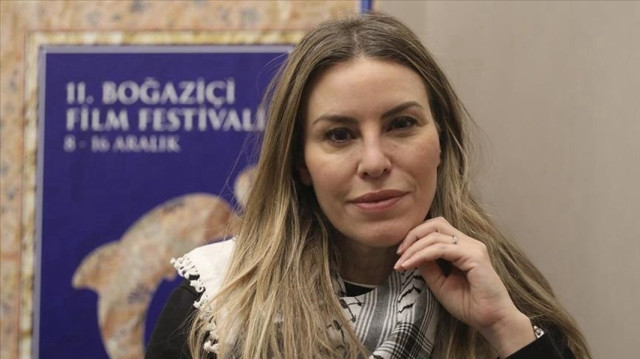
Farah Nabulsi's new film The Teacher takes audiences on an emotional journey through the realities of life under Israeli occupation
Oscar-nominated and BAFTA award-winning Palestinian-British filmmaker Farah Nabulsi is calling for global empathy for Palestinians through her debut feature film, The Teacher.
In an interview with Anadolu, Nabulsi said her goal is to challenge audiences to reflect on the hardships Palestinians face under occupation. “I really want people to ask themselves: Is this a reality they would accept for themselves? And if it isn't, why have Palestinians been expected to?”
Nabulsi shared her experiences filming The Teacher, which premiered at the Toronto Film Festival on Sept. 9, 2023.
“Given the current reality in Palestine, as Israel conducts a genocide in Gaza, I hope this film offers a deeper human context to that reality. The sociopolitical is important but often missing from the discourse.”
Born and raised in the UK, Nabulsi said a visit to Palestine a decade ago profoundly changed her perspective.
“Despite thinking I knew about the injustice and discrimination, witnessing it firsthand—checkpoints, demolished homes, detained children—was shocking,” she recounted.
“This injustice hit me deeply,” she continued, explaining that storytelling became her way to process and respond.
- Drawing inspiration from real life
Nabulsi said the script for The Teacher was shaped by her conversations with Palestinians and her observations during her time in Palestine. The film addresses settler violence, home demolitions, and the treatment of children in military courts.
Referring to a 2011 exchange where an Israeli soldier was released by Hamas in return for over 1,000 Palestinian prisoners, Nabulsi highlighted the disparity in the perceived value of human life.
“It's this idea that Palestinian lives are not valued like Israeli Jewish lives. That imbalance inspired the story,” she said.
“I never could have imagined, though, the exponential magnification of that imbalance, as we now witness hundreds of thousands of Palestinians being killed, maimed, starved, and subjected to malnutrition and disease in Gaza.”
- Filming amid real-life injustices
Filming in the occupied West Bank brought emotional and logistical difficulties, Nabulsi said.
“I didn't realize how emotionally taxing it would be to witness these injustices while shooting scenes replicating them,” she said.
“It's different from reading about it or watching it on the news. When your cast and crew have lived through these realities, you feel a responsibility to do justice to their experiences. It takes a mental and emotional toll.”
The film was shot near the village of Burin, close to Nablus in the occupied West Bank, where challenges arose during production.
“We heard that illegal Israeli settlers had descended onto the village, torching olive groves—something depicted in the story itself. On another occasion, I encountered a family with six children standing before the rubble of their freshly demolished home, an act mirrored in the film.”
Nabulsi said she hopes her work will inspire audiences to empathize with Palestinians and support their pursuit of freedom.

